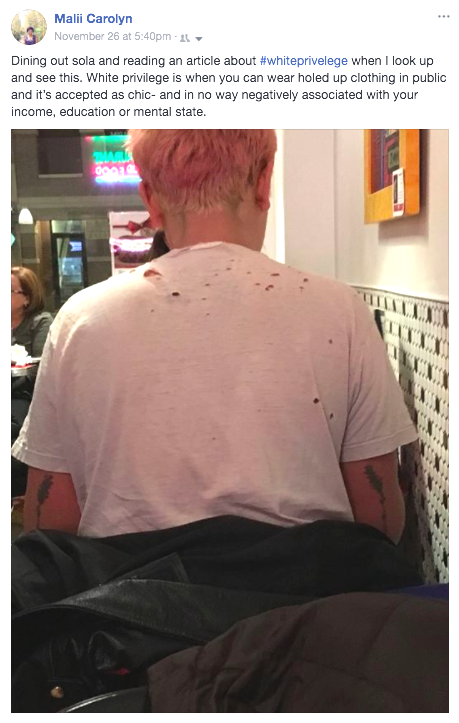|
We’re not Facebook friends, so I’d like to invite you into a current conversation thread on my Facebook page that’s somehow struck a chord. In this blog edition, I share the organic evolution of an unremarkable conversation among my social network, and highlight two things: 1) How we tend to recycle the same kinds of conversations about human disunity, and 2) How we can change the conversation for good. .Funny how fashion trends can make such strong statements on privilege and power. Before making the post pictured here, I consulted with Uncle Google on whether “holed up” clothing was a thing. First on the list of Internet search results was a set of advertisements for “distressed” t-shirts worn by petite models who presented as young, female and white. Another search produced the article, “Homeless Inspired Fashion Collection Sparks Debate at Men’s Fashion Week” (Feb. 2017). So yes, the pink-haired person who dined at the table next to mine that Nov. evening was a part of a fashion phenomenon beyond herself. Though isn’t it—and hasn't it historically been— those who are themselves distressed by capital-driven socio-economics that present in public with threadbare clothing? Since when did clothing itself become distressed? And, what does it say that socially-enfranchised white bodies of the right size and ability are the pick of choice for that “super dope” look[i] ? “Never mind,” says the person who points out the obvious, “everything isn’t about race.” The R-word, of course, made its way into the Facebook conversation in question. Typically, "race"/ "racist"/ "racism" are part of the world cloud when “privilege" and "power” come into play. Stating these words is not the offense—racism is the offense--and as I have experienced it, the introduction of the word tends to color and constipate conversation. Relieving peoples’ discomfort is not my concern here; the greater good is about collectively producing valuable learning outcomes for all involved. PRO TIP #1: Without “coding” your language, mix it up sometimes by editing the R-word from your comments, and then observe how it makes a difference in who speaks-- and what’s contributed-- to the conversation[ii]. Our Facebook conversation started with simple agreements in response to my post: Likes; Sad and Wow faces; the comment, “Fact.” I generally appreciate the figurative nod of a Like, or any other one-click social media engagement as much the next person. Though, it’s those gestures toward dialogue that I super like! Spoiler alert: The criteria for actual communication have not diminished with the explosion of communication by electronic means. Agreements and disagreements alone do not lend themselves to meaningful exchange. PRO TIP #2: Add a comment that inspires more than a modicum of thought. One friend, for instance—pale-skinned, grey-haired and always with the right shade of red lipstick—gave and lent the following thought: At some point in our Facebook conversation, I mentioned my speculative fears about raising bebes whom I haven't yet birthed into the sea of bias we all wade through daily. A college friend of South Asian heritage was gracious in her response, sharing her lived experience of “always [being] careful about how [she] dress[es her bi-racial, brown-skinned] child [likely identified by the world as Black] and how [she does] her hair, despite teaching her that the beauty inside her is what is most important.” What did I learn about speaking from fear as it relates to power and privilege? PRO TIP #3: Speak on what you know; on the world you've encountered; on what you choose. And, if in the conversation at hand you don’t know much or what to say, say so. That counts, too.
Virtually Yours, Malii Carolyn Malii who? Read my last #BlahBlahBlah blog post, Meet Malii Carolyn! (Previously Malii Brown). [i] "Super dope" is how the Senior Beauty Editor at Cosmopolitan.com described the so-called "next-level distressed" trend in an article entitled, “Everyone Is Obsessed With Shredding Their Clothes Right Now" (Aug. 2016). Cosmo is an international fashion magazine for women printed in 35 languages and distributed in 110 countries (Wiki). [ii] Thanks to Dr. Thomas Kochman and Jean Mavrelis from whom I have learned well-researched guidelines for productive conversations around race.
2 Comments
|
EngageBetween...people. place. purpose. |

 RSS Feed
RSS Feed